Wu Tsai-li is all business as he leans over a pile of human bones that he’s just dumped on top of a grave, and begins to arrange them back into a vaguely skeletal form.
Wu is in the process of performing a rite of ancestor worship called “picking up the bones.” A part of a ritual generally known as double or second burial, the bones are placed in an urn with the skull at the top. The urn is then re-interred in the ancestral tomb.
Common in Taiwan for over two centuries, the custom has its origins in China’s Fujian Province. When farmers and merchants began migrating to Taiwan in the 17th century, they brought with them their custom of second burial. Over time, the tradition began to spread in Taiwan as it was an inexpensive way of sending the bones back to Fujian for burial in the ancestral tomb.
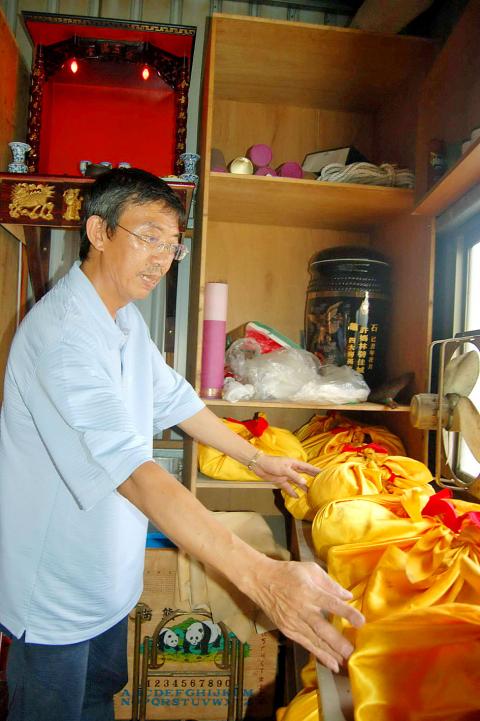
Photo: Liu Hsiao-hsin, Liberty Times
照片︰自由時報記者劉曉欣
However, as their roots sank deeper into the nation’s soil and people from Fujian began to regard Taiwan as their home, the process of returning the urns to China ceased as family plots were established in Taiwan.
The process, which has changed very little over the centuries, begins with the first burial taking place almost immediately after death. Regarded as a temporary grave, the body remains underground for at least seven years.
The length of time allows the flesh to decompose, making it easier for Wu, a “bone-picking” master, to clean the remaining flesh so that all that is left are the bones. After the flesh is removed, the bones are set out under the sun for three days to dry. They are then “picked up” and placed into the urn, and returned to the family gravesite.
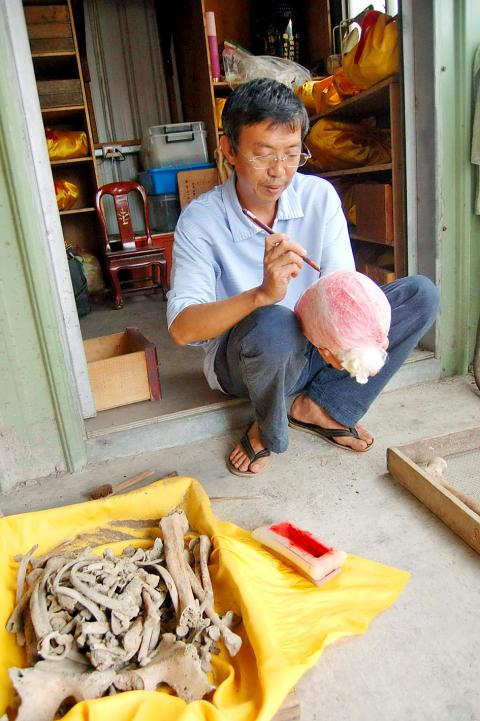
Photo: Liu Hsiao-hsin, Liberty Times
照片︰自由時報記者劉曉欣
If it happens that the flesh hasn’t achieved a level of decomposition suitable for cleaning, Wu sprinkles rice wine over the corpse and dresses it with the leaves of six heads of cabbage. The body is then re-interred. The concoction is enough to ensure sufficient decomposition after an additional three months.
The reason for such an elaborate procedure, Wu says, is that the soul adheres to the bones and not the flesh. This is why the flesh is dispensed with and the bones are re-buried after cleaning.
(Noah Buchan, Taipei Times)
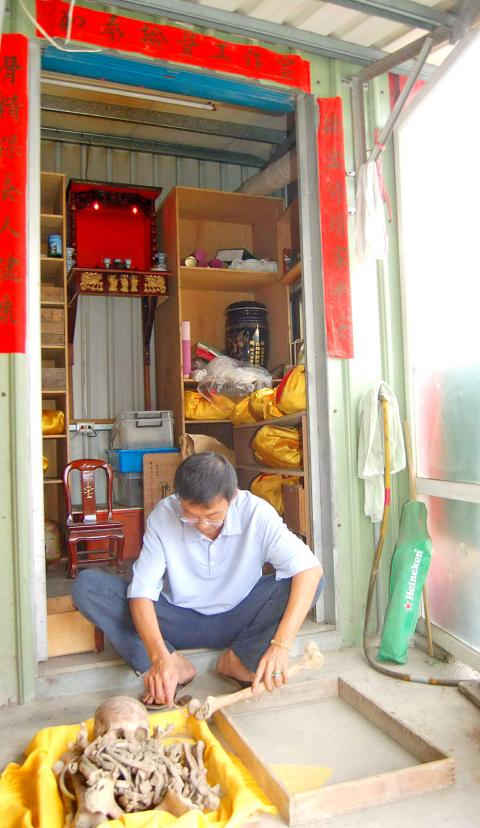
Photo: Liu Hsiao-hsin, Liberty Times
照片︰自由時報記者劉曉欣
吳財立莊重肅穆地俯身向前,面朝著他剛剛倒在墓地上的一堆人骨,開始進行整理,重新排列成一組模糊的骨骸。
吳財立正在進行祭拜祖先的一項儀式,稱為「揀骨」。在這項通常又稱「二次葬」的儀式中,祖先遺骨會被安放在金斗甕中,頭骨放在最上方,再將金斗甕重新葬入祖墳中。
超過兩世紀以來,在台灣廣泛可見的這項習俗,源自於中國的福建省。隨著當地農民與商賈人士在十八世紀移居台灣,他們將「二次葬」的習俗也帶了過來。時光荏苒,這項傳統逐漸盛行於台灣各地。主要的原因在於,當時的先人如果想將祖先遺骨送回福建,葬入祖墳,這種方式並不算昂貴。
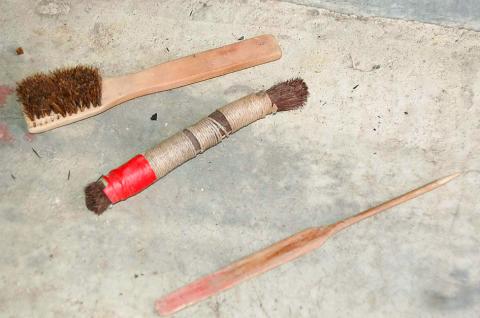
Photo: Liu Hsiao-hsin, Liberty Times
照片︰自由時報記者劉曉欣
不過,隨著先人逐漸深入扎根於台灣的土地,來自福建的移民也開始視台灣為家鄉,將金斗甕送回中國的習俗遂逐漸式微,人們也在台灣建起自己家的祖墳。
幾世紀以來,撿骨儀式的過程並沒有太大的改變。首先是一次葬,幾乎在過世後馬上開始進行。接下來遺體會在地下待上起碼七年,這段時間的墳墓則被視為暫時性的。
時間的長度會讓肉體逐漸分解,也使撿骨師傅吳先生更容易清理殘留的身體組織,最後只留下骨頭。徹底清除餘肉後,再將骨頭鋪在太陽底下曝曬三天,進行乾燥,接著便是「撿骨」,放入金斗甕,再重新葬回家族墓園。
萬一發生肉體還未達到適合清理的腐化程度時,吳師傅會在屍身上灑下米酒,再用六顆高麗菜裹住,再度葬回土中。米酒和高麗菜混合的成份足以確保腐化效率,再等三個月後就能重新撿骨。
根據吳師傅的說法,如此複雜的程序,背後原因在於靈魂附著於骨骸而非肉體上。這也就是為什麼肉體最後會被捨去,而骨骸則會在清理後重新下葬。
(台北時報章厚明譯)

A: In addition to “Mission: Impossible 8,” what other new movies are in theaters? B: “Final Destination: Bloodlines” and “The Wedding Banquet” are out. The French film “Jane Austen Wrecked My Life” will also open soon. A: The Final Destination horror movie series is so scary that I don’t dare watch it. B: Then how about “The Wedding Banquet,” which is a 2025 remake of the 1993 classic of the same title? Oscar-winning actress Youn Yuh-jung’s performance in it is highly anticipated. A: But as a fan of British writer Jane Austen, I’m more interested to see how her works

US President Donald Trump on Monday last week signed the TAKE IT DOWN ACT (Tools to Address Known Exploitation by Immobilizing Technological Deepfakes on Websites and Networks Act), bipartisan legislation that enacts stricter penalties for the distribution of non-consensual intimate imagery, sometimes called “revenge porn,” as well as deepfakes created by artificial intelligence. The measure, which goes into effect immediately, was introduced by Sen. Ted Cruz, a Republican from Texas, and Sen. Amy Klobuchar, a Democrat from Minnesota, and later gained the support of First Lady Melania Trump. Critics of the measure, which addresses both real and artificial intelligence-generated imagery, say
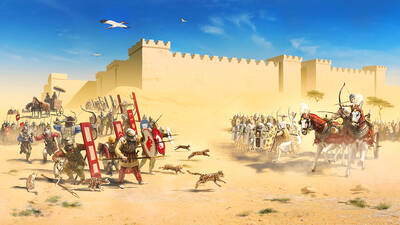
Cats ruled in ancient Egypt—and not just in their own minds. These clever, graceful creatures were so deeply respected by the Egyptians that harming one could lead to severe punishment, even death. But why did the Egyptians hold cats in such high regard? It wasn’t just because they were cute; cats played a crucial role in protecting the country’s grain stores from pests. As guardians of Egypt’s food supply, they were seen as sacred animals. The Egyptians honored them through Bastet, the cat-headed goddess of protection, the home and fertility. Egyptians didn’t just love cats; they worshipped them. Cats lived in luxury,

A: Wanna go see a movie during the three-day weekend for the Dragon Boat Festival? B: Sure, I wanna see “Mission: Impossible – The Final Reckoning.” A: Rumor has it that this may be actor Tom Cruise’s last mission with the Mission: Impossible action movie franchise. B: Tom was only 34 when the first installment of the series was released in 1996. Now, he’s 63 and the eighth installment is out. A: I hope he’ll stay with the series. Let’s go see him fight against AI this weekend. A: 端午節三天連假週末要不要去看電影? B: 好啊我想看 《不可能的任務:最終清算》! A: 這有可能是湯姆克魯斯最後一次為動作片《不可能》系列出任務。 B: